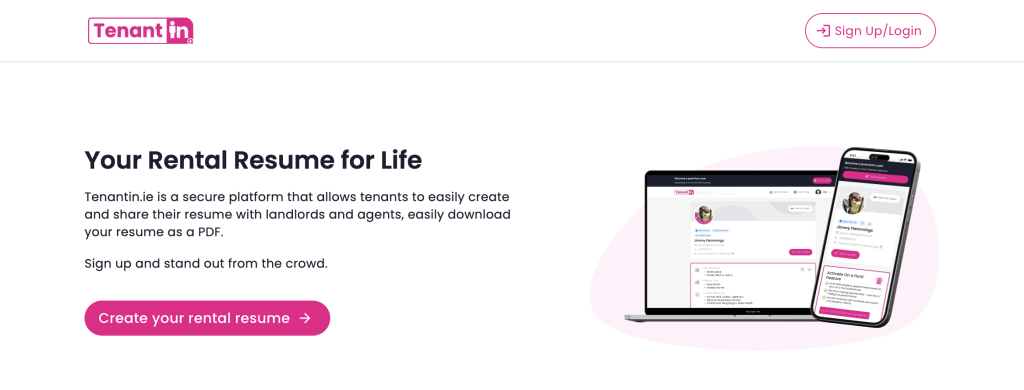Moving to Ireland can be an exciting adventure, but finding a place to live is often one of the biggest hurdles for expats. The rental market is fast-paced and competitive, and understanding local expectations is key to success. Whether you’re relocating for work, study, or a fresh start, having a solid understanding of how renting in Ireland works—and how to present yourself as a tenant—can make a world of difference.
In this guide, we’ll walk you through the essential things every expat should know before applying for housing in Ireland. From building a strong tenant resume to documenting your rental history, we’ve got you covered.
The Irish Rental Market: What to Expect
Ireland’s rental market, especially in cities like Dublin, Limerick, and Cork, is known for its high demand and limited availability. Properties are often snapped up within days, and competition can be intense—especially if you’re new to the country.
Landlords and letting agents typically look for tenants who are prepared, professional, and ready to move quickly. This is why having your paperwork in order before you start searching will give you a competitive edge.
Start with a Strong Tenant Resume
A tenant resume is one of the best tools you can have when applying for a rental as an expat. It’s essentially a rental CV that introduces you to landlords and highlights your suitability as a tenant.
Your tenant resume should include:
- Full name and contact information
- Brief personal bio
- Employment or income details
- Previous rental history (even if it’s from outside Ireland)
- References from landlords or employers
- Any relevant documents (passport, visa, proof of income)
Creating this kind of profile shows landlords that you are organised and serious. It also helps bridge the trust gap, especially if you haven’t rented in Ireland before.
Tenantin.ie offers a free tool that helps you create your tenant resume in minutes. Once you’ve filled in your information, you can download your resume and start sending it directly to landlords.
Understanding Rental History as an Expat
Many expats worry about not having a local rental history, but this doesn’t have to hold you back. If you’ve rented in your home country, you can include that in your tenant resume. Be sure to add contact details for past landlords and mention any long-term leases, timely payments, or positive references.
If you haven’t rented before, highlight your job stability, income, or the fact that you have savings. Employers or college administrators can also serve as character references.
What matters most to Irish landlords is that you appear reliable and financially secure.
Documents to Prepare Before Applying
When you find a property you like, you’ll need to act fast. Having these documents ready will make the application process smoother:
- Valid photo ID (passport or national ID)
- Immigration or visa documents if applicable
- Proof of income (payslips, contract, or bank statements)
- Reference letters (from previous landlords, employers, or university)
- Completed tenant resume
You may also be asked to provide a security deposit (usually one month’s rent) and one month’s rent in advance. Be cautious about sending money before viewing a property or signing a lease.
How to Search for a Rental in Ireland

Knowing where and how to search can save you time and frustration. Here are some tips for expats:
- Set your criteria: Decide on location, budget, and property type before starting your search.
- Be flexible: You may need to compromise on size or location to find a suitable home quickly.
- Stay proactive: Enquire as soon as a listing goes live. The sooner you respond, the better your chances.
- Be prepared to view quickly: Virtual and in-person viewings happen fast, so be ready to attend or send your documents right away.
If you’re looking for extra support, Tenantin.ie offers a premium service called “On a Hunt”, which includes:
- Daily email alerts from multiple listing sources
- Automatic applications sent to matched properties
- A dedicated account manager to assist with your search
- Promotion of your tenant profile to active landlords
Even if you stick with the free resume tool, you’ll already be ahead of most applicants.
Making a Good Impression at Viewings
Whether your viewing is in person or online, making a good impression is essential. Here’s how to stand out:
- Be on time and dress appropriately
- Show genuine interest and ask relevant questions
- Mention that you have your documents ready
- Follow up with a polite message and your tenant resume
Remember, landlords are not just assessing your income—they’re looking for tenants who are respectful, clean, and easy to communicate with.
Lease Agreements and Legal Rights
Once you’ve been accepted, you’ll be given a lease agreement. Read it carefully before signing. It should outline:
- Monthly rent and deposit
- Lease duration
- Utility responsibilities
- Termination notice period
- Rules on guests, pets, and maintenance
By law, your tenancy must be registered with the Residential Tenancies Board (RTB). You’re also protected under Ireland’s tenancy laws, even as an expat. Make sure you understand your rights and responsibilities to avoid issues later on.
Avoiding Rental Scams
Unfortunately, rental scams do occur, particularly targeting people who are unfamiliar with the local market. Be wary of the following red flags:
- A landlord asking for money before a viewing
- Listings with vague descriptions or no photos
- Prices that seem too good to be true
- No official lease or refusal to meet in person
Always view the property and verify the landlord’s identity before transferring any money.
How Tenantin.ie Supports Expats
As an expat, you might feel at a disadvantage when applying for rentals in Ireland. Tenantin.ie was built to make this process easier for newcomers. With a free tool to help you build a professional tenant profile and download your tenant resume, you can approach landlords with confidence—even without local references.
Our premium service adds daily alerts, automatic applications, and hands-on support from experienced account managers. We’ve helped hundreds of tenants improve their chances of securing a home, especially those navigating the process from abroad.
Final Thoughts

Finding housing as an expat doesn’t have to be overwhelming. By creating a clear tenant resume, gathering your documents in advance, and understanding what Irish landlords look for, you’ll be well-equipped to navigate the rental process.
Take your time to research, be proactive, and make use of the tools available to you. With a bit of preparation, you can find a great place to call home in Ireland—whether it’s for a year or for the long haul.
Frequently Asked Questions
What types of rental accommodations are available in Ireland?
Ireland offers a range of rental accommodations, including apartments, houses, and shared living spaces. Apartments are common in urban areas, while houses may be more available in suburban or rural regions. Shared accommodations such as house shares are also popular among expats looking to save on costs.
How can I find rental properties in Ireland?
You can search for rental properties through various platforms and agencies. Websites like tenantin.ie provide listings and detailed information about available properties across Ireland. It’s a great starting point for exploring your options.
What documents do I need to apply for a rental property?
Typically, you’ll need identification (such as a passport), a reference from a previous landlord if applicable, proof of income or employment, and sometimes a bank statement. These documents help landlords assess your suitability as a tenant.
How much is the average rent in Ireland?
Rent prices vary significantly depending on location. Urban centers like Dublin tend to have higher rents compared to more rural areas. It’s advisable to research specific areas using platforms like tenantin.ie to get an accurate sense of current market rates.
Are utilities included in the rent?
Utilities such as electricity, gas, water, and internet are often not included in the rent and are usually paid separately by the tenant. Always check the lease agreement for specifics on what is included.
Do I need to pay a security deposit?
Yes, it is standard practice in Ireland for tenants to pay a security deposit, typically equivalent to one month’s rent. This deposit is refundable at the end of the tenancy, provided there is no damage beyond normal wear and tear.
What rights do tenants have in Ireland?
Tenants in Ireland have several rights including the right to a safe and habitable home, privacy, and proper notice before eviction or rent increases. Familiarize yourself with these rights by visiting resources like findqo.ie which offer detailed information on tenant rights.
Can I negotiate my lease terms?
While some aspects of a lease may be negotiable, such as minor changes to terms or conditions, major elements like rent price are less likely to be flexible unless there are unusual circumstances. It’s always worth discussing any concerns with your prospective landlord.
Is renter’s insurance necessary?
While not mandatory by law, renter’s insurance is recommended as it can protect your personal belongings against theft or damage. It’s an additional safeguard that many tenants choose to invest in.
What should I look out for during property viewings?
During viewings, check for signs of dampness or mold, ensure all appliances are functioning properly, and assess the general condition of the property. Don’t hesitate to ask questions about maintenance responsibilities or neighborhood amenities.






